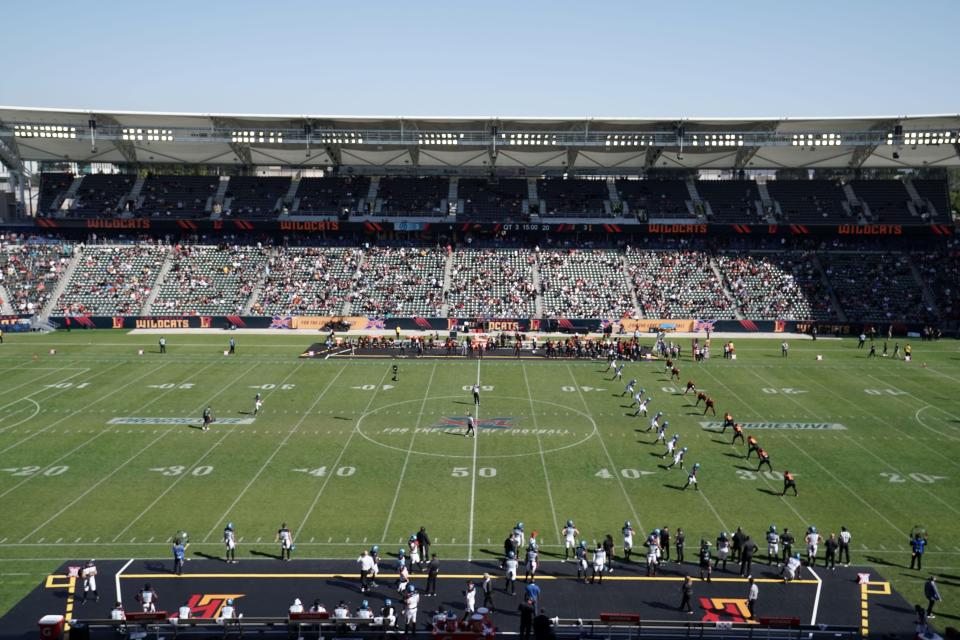Origins of new NFL kickoff rule go back to demonstration with sugar packets on a table
The new NFL kickoff rule can trace its origin story to a Splenda packet in a boardroom.
As "XFL 2020" pitched television networks, Sam Schwartzstein − then the ill-fated league's director of football operations, innovation and strategy − had the role of helping highlight the variations that could attract eyeballs to a WWE-backed startup spring football league. His boss, former commissioner Oliver Luck, was about to meet with executives from Turner Sports when Schwartzstein demonstrated what was the skeleton format of the kickoff rules officially adopted by the NFL on Tuesday on one-year, trial basis.
Except, more than six years ago, Schwartzstein had no time to create a formal PowerPoint presentation. Luck improvised. A cup of sugar represented the ball. Sweet & Low was the cover team. Splenda, the return team.
"And he laid it all out on the table in a meeting with Turner broadcast," Schwartzstein told USA TODAY Sports.
Later that night, Schwartzstein sent over a more visually pleasing presentation and received a response that was along the lines of:
"Yeah, this is a little bit better than sugar packets."
NEW KICKOFF RULE: 5 things to know
Keeping the spirit of the kickoff alive
Schwartzstein, now an analytics and insights producer for Amazon's NFL "Prime Vision," had help creating the modified kickoff. Bryan Kilmeade (now with the United Football League), Luck, former NFL cornerback Justin King and East-West Shrine Bowl director Eric Galko all had a hand in it. The process was to gather experts, formulate ideas, test everything and rely on the data.
"It may look pretty radical," Schwartzstein said, "but it’s not that radical.
"It’s exciting for a lot of the former people who worked on this."
For the kickoff, starting the play from the instant the ball is caught instead of when it is kicked became the XFL's guiding principle of the kickoff adjustment. Schwartzstein said the goal was to mimic what the NFL game already had − exciting plays − and create an environment that was safer for players, included more action instead of touchbacks and resulted in similar field position.
They also wanted to keep the "foot" in football, Schwartzstein said, and thought proposals that would eliminate the kickoff (such as the "Schiano Rule") were unnecessary.
"What makes the kickoff so cool is that it’s the 100-yard play. And we still have that in this version of the kickoff because teams can kick it in the field of play, returners can get it, and it’s the most exciting play in football," said Schwartzstein, who was the center for Andrew Luck while playing for Los Angeles Chargers head coach Jim Harbaugh at Stanford a decade-plus ago.

Testing, 1, 2, 3...
Schwartzstein and the XFL needed more than packets and PowerPoints to make stakeholders believe in a reimagined kickoff. They had to test it. And in junior college teams Pearl River College and Mississippi Gulf Coast Community College, Schwartzstein had willing participants to gather a data set.
Still, he "honestly had no idea" what to expect.
"Until you see it, you don’t really know," Schwartzstein said. "And it looked like a normal kickoff."
Making the game safer?
Eliminating the high-speed collisions that lead to injuries was something proven by the data over the course of testing and about 400 kicks in the 2020 XFL season. There were zero concussions, according to Schwartzstein.
"This is about head injury prevention," Schwartzstein said.
The average starting field position was close to the 30-yard line during that XFL season, near what was then the NFL average, close to the 28-yard line.
Same, but different
There are a few variations within the NFL rule that differ from what was deployed in the XFL in 2020 and 2023. (Although XFL 2023 operated under different ownership, the league adopted the identical kickoff rule.)
Schwartzstein identified six differences between the XFL rule and the NFL rule that gives the NFL a “more refined” format that matches the league's research.
"I've seen every XFL kickoff in the last two years, so we know what this play is going to look like," NFL competition committee chairman Rich McKay told reporters. "I think it’s going to look better than that."
"When you look at the modifications we’ve made, with this hybrid kickoff, you're going to see some drastic differences," Saints special teams coach Darren Rizzi said.
One obvious difference is the talent level and the personnel.
"I think they're going to accentuate the talent," Schwartzstein said of NFL players
Get ready for it to look 'weird'
Schwartzstein found himself watching football at an unorthodox hour not long ago and didn’t realize the European Football League had adopted the kickoff rule he helped create. It still caught him by surprise — not that the proliferation of his idea had gone worldwide. He thought it looked odd.
"So even I, the creator of the rule who had watched it more than anyone else in the world, thought it looked weird when I saw it out of place," Schwartzstein said.
It will be a matter of fans getting used to it.
"It looks weird to people the first time − I’m not going to deny that," Schwartzstein said. "But the more you watch, the more you realize how exciting it can be."
Contributing: Safid Deen, USA TODAY
This article originally appeared on USA TODAY: NFL new kickoff rule: Origins trace back to 'XFL 2020' pitch meeting

